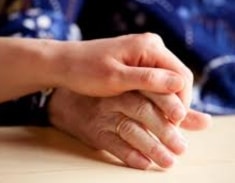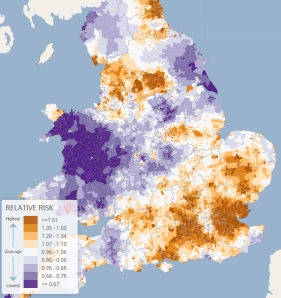How does a mesothelioma diagnosis affect a person and their carer?
By Kathy Cooke. 30th April 2014
A recent research project from Australia may help improve our understanding of some of the issues affecting mesothelioma victims and their carers and family.

The Asbestos Narratives published last month is a research project funded through the Comcare Asbestos Innovation Fund (Wave 2) and was carried out by researchers, including Grant Cairncross, from Southern Cross University, Australia.
It is compelling reading for both health and legal professionals and will no doubt increase their awareness of the impact of such a diagnosis on the asbestos victim and their carers.
The research comprised of both quantitative and qualitative studies and over 60 male and female patients with an asbestos related diagnosis, including mesothelioma, and carers shared their experiences. The aim was to provide new evidence-based insights into three areas - the social, psychological and economic impacts of an asbestos related disease - in order to inform the ongoing provision of support for these people in Australia.
Feelings of Isolation in Mesothelioma Victims and their Carers
Some of the issues faced by the interviewees may not be as relevant in this country e.g. due to a different geographical spread, legal and benefit system, but there are some parallels we can draw from it.
Australia covering 7,692,024 sq km is the world's sixth-largest country by total area with a population of around 23million. It is no wonder that the interviewees had feelings of isolation. They may be the only person in their community with such a disease and may need to travel hundreds of miles to receive the required healthcare and support.
Compare Australia with England's much smaller geographical area of 130,395 sq km with well over double the inhabitants and this perhaps should not be the case but I would suggest that feelings of isolation still exist in this community. Mesothelioma cases are uncommon – just over 2,000 each year in the UK - and many people are still unaware of the diseases related to asbestos unless they, or a close family member, have been diagnosed with one. Treatment, if any is suitable, is usually offered in specialist centres, miles from the victims’ home and so locally there may be nobody who can truly understand the impact of such a diagnosis and provide effective support.
Supporting the Carers
Patients and carers with a strong social support network have been shown to have a lower risk of developing depression and anxiety and one way of developing support with someone who can understand may be through participation in support groups.
‘Talking to people that have gone through it is easier than talking to other people’ – said one carer in the Australian study.
Interesting quantitative results from the study showed that the carers felt they received less social support from someone special than the actual asbestos victim did. The multi-faceted effect of an asbestos related diagnosis on the victim's family should never be underestimated. In this study, carers repeatedly reported the negative effect it had on their own health, both physically and mentally. Normal life ceased to exist for many - they had new responsibilities of caring for someone and doing their share of the chores alongside new responsibilities. Some days felt like a merry-go-round of appointments – ‘there was no escape from the diagnosis’.
Financial difficulties were also a cause for concern for both the victim and the carer. It may be that one or both could no longer work, so there was a loss of financial independence, a reliance on benefits - if indeed eligible - and a fundamental change in all monetary decisions and plans. The benefit and compensation system are different in England compared with Australia but there is no doubt that financial worries will be there for the families irrelevant of location.
UK Mesothelioma Survey

A recent UK survey - due to end tomorrow - has given mesothelioma victims, carers and family members a chance to identify and prioritise unanswered questions about mesothelioma. The results from the study, funded by the National Institute for Health Research and organised by the James Lind Alliance, will be published late 2014 and will be used to inform future research topics, deemed relevant by patients, carers and doctors.
The need for specialist mesothelioma training for health professionals was raised by the Australian study. This is happening in the UK but is not consistent. An advert for the development of a Mesothelioma Clinical Nurse Specialist post in the NE has recently been posted - www.mkmrf.org.
This type of approach needs to be done all over the country - particularly in those hot spot areas for asbestos related disease - see the latest risk map (above) for mesothelioma incidence in England and Wales which shows highest risk in areas of previous and current ship building including the NE. http://www.envhealthatlas.co.uk/eha/Mesothelioma/
Social media (viewed with caution) can help asbestos sufferers and their families with some peer to peer support and also keep them up-to-date with the latest legal and medical news pertaining to their disease.
There is much work to be done in supporting the victims of asbestos and their carers and we look forward to the results of the James Lind Alliance Study later this year.
Author
Kathy Cooke MA. BSc
Cancer consultant and advisor
Kathy has worked in the cancer field for over 30 years. She was course leader for the MSc in Radiotherapy and Oncology at University of Hertfordshire. Then pre-treatment radiotherapy manager at the Cromwell Hospital in London and Partnership Quality Lead for Macmillan Cancer Support.. Read more >












